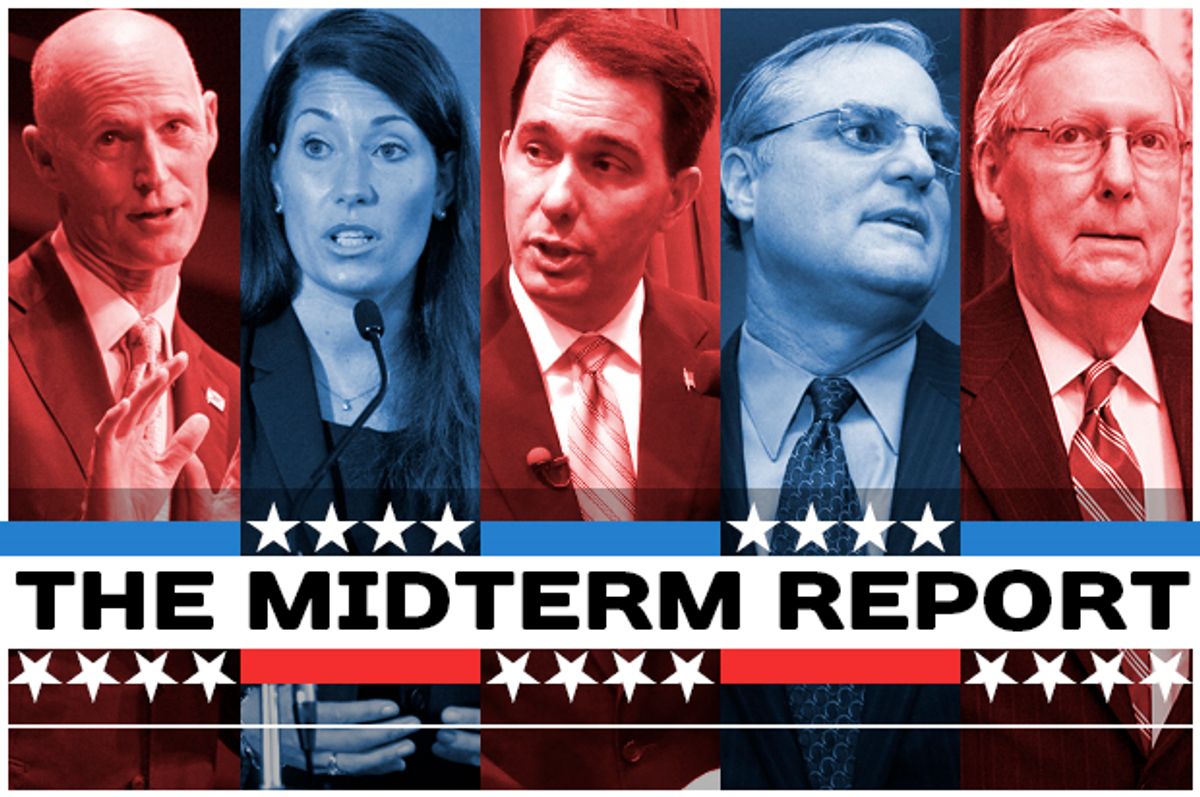Forecasters give the GOP pretty good odds of recapturing the Senate this year, but they’re quick to caution that a Republican Senate is far from a foregone conclusion. And while the sheer number of Democratic seats in play gives the GOP multiple plausible paths to a Senate majority, it’s far from unthinkable that, as in 2010 and 2012, deeply flawed candidates could dash the party’s hopes for Senate power.
Before we get into that, let's envision the following midterm scenario. Let's say Republicans seize Democratic-held seats in West Virginia, Montana, Arkansas, Louisiana and Alaska. Democratic victories in the latter three states are still possible, but Republicans have clear edges in each of them. Then let’s assume that Senate Minority Leader Mitch McConnell fends off Democrat Alison Lundergan Grimes in Kentucky, Democratic Sen. Kay Hagan maintains her small lead and prevails in North Carolina, and Democratic Sen. Jeanne Shaheen of New Hampshire defeats GOP challenger Scott Brown.
So far, we’re looking at a map with 47 Democratic-held seats and 48 GOP seats. We’re left with tossup races in Iowa, Georgia, South Dakota, Kansas and Colorado. Let’s say that Kansas reverts to its Republican mean and sends Pat Roberts back to the Senate for a fourth term, while former GOP Gov. Mike Rounds ekes out a narrow win in South Dakota. Meanwhile, Sen. Mark Udall continues in Colorado Democrats’ tradition of outperforming the polls and manages to pull off a win over Cory Gardner. That gives us a map with 50 GOP seats; the party now just needs to win either Iowa or Georgia to retake the Senate.
But those two states aren’t looking quite as good for Republicans as they did even one week ago. In Iowa, Republican Joni Ernst continues to hold a slight lead over Democrat Bruce Braley, but independents appear to be abandoning Ernst in favor of Braley. Moreover, Democrats are touting strong early voting numbers, which indicate that the party is turning out many voters who stayed home during the 2010 midterms. Note, as well, that Iowans prefer Braley’s positions on the issues to Ernst’s – and newly released audio of Ernst discussing the “very painful” effect her policies would have on “people that rely on the government to provide absolutely everything for them” will bring renewed scrutiny to her ultraconservative views. By running a personality-focused campaign, Ernst has done her best to downplay those views, but the new revelation of her own 47 percent moment undercuts her carefully crafted image as a middle-class, hog-castrating Iowa farmer.
Meanwhile, Republican David Perdue’s lead in Georgia, where Republican Sen. Saxby Chambliss is retiring, has vanished in the wake of his recent remark that he is “proud” to have spent most of his business career outsourcing jobs – a comment that’s especially impolitic in a state with an 8.1 percent unemployment rate. If neither Perdue nor Democrat Michelle Nunn wins 50 percent on Election Day – the contest includes a Libertarian who’s been polling in the mid-to-high single digits – then the race is headed to a Jan. 6 runoff. No public poll has shown Perdue or Nunn hitting that threshold yet, but Politico reports that Nunn’s internal polls show her edging ever closer to it.
If GOP candidates’ stumbles in Iowa and Georgia cost the party control of the Senate, it won’t be perfectly analogous to 2010 and 2012, when inflammatory Tea Party candidates given to bizarre remarks about witchcraft, rape and abortion delivered key contests to the Democrats. While Ernst is especially extreme in her conservatism, her Romneyesque comments about the government-dependent may do her just as much damage among Iowa’s remaining undecided voters. Similarly, Perdue would likely be holding a modest lead right now if not for his tone-deaf outsourcing remark. With these two contests very much in play – and with races like Kansas and South Dakota far from sure things for the GOP – Mitch McConnell may want to wait before measuring the drapes in the Senate majority leader’s office.



Shares